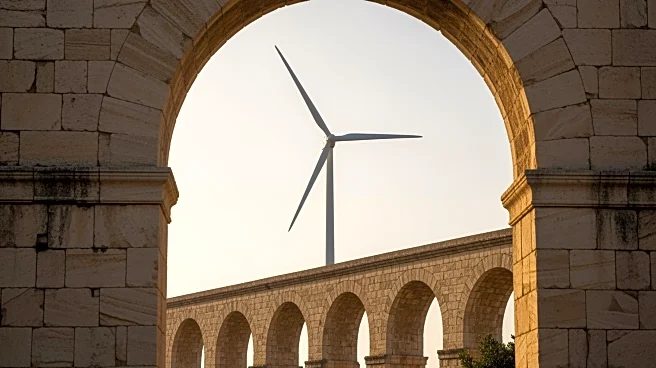What's Happening?
Economist Paul Krugman has highlighted the explosive growth of renewable energy over the past decade, attributing this to a 'virtuous circle' of falling costs and increased production, driven by subsidies.
Krugman draws parallels between current renewable energy advancements and historical infrastructure projects, such as the Erie Canal, which facilitated economic development in the early United States. He notes that solar and wind energy, which produced 15% of the world's electricity in 2024, are now unstoppable forces in the energy sector. This growth continues despite some U.S. policy efforts to revert to coal, with significant geopolitical implications as China advances in renewable energy. Krugman references historical figures like Alexander Hamilton, who advocated for government investment in new technologies to boost the economy, underscoring the enduring importance of such investments.
Why It's Important?
The growth of renewable energy is crucial for the U.S. as it seeks to transition from fossil fuels to more sustainable energy sources. This shift has significant implications for the energy industry, potentially reducing reliance on coal and oil, and fostering innovation and job creation in the renewable sector. The geopolitical aspect is also noteworthy, as countries like China are rapidly advancing in renewable technologies, which could alter global energy dynamics and influence international relations. The historical context provided by Krugman emphasizes the long-standing role of government investment in driving technological progress and economic growth, suggesting that continued support for renewables could position the U.S. as a leader in the global energy transition.
What's Next?
The continued expansion of renewable energy is likely to face challenges from political and industry stakeholders who favor traditional energy sources. However, the momentum in solar and wind energy suggests that these sectors will keep growing, potentially leading to further policy shifts and investments. As the U.S. navigates this transition, there may be increased focus on infrastructure development to support renewable energy distribution and integration into the national grid. Additionally, international competition in renewable technologies could spur further innovation and collaboration, influencing future energy policies and economic strategies.
Beyond the Headlines
The shift towards renewable energy raises ethical and cultural questions about environmental responsibility and sustainable development. As the U.S. and other nations invest in green technologies, there is potential for long-term shifts in energy consumption patterns and cultural attitudes towards sustainability. This transition also poses legal challenges, as existing regulations may need to be updated to accommodate new technologies and energy sources. The historical parallels drawn by Krugman highlight the cyclical nature of economic development and the enduring impact of infrastructure investments on societal progress.










